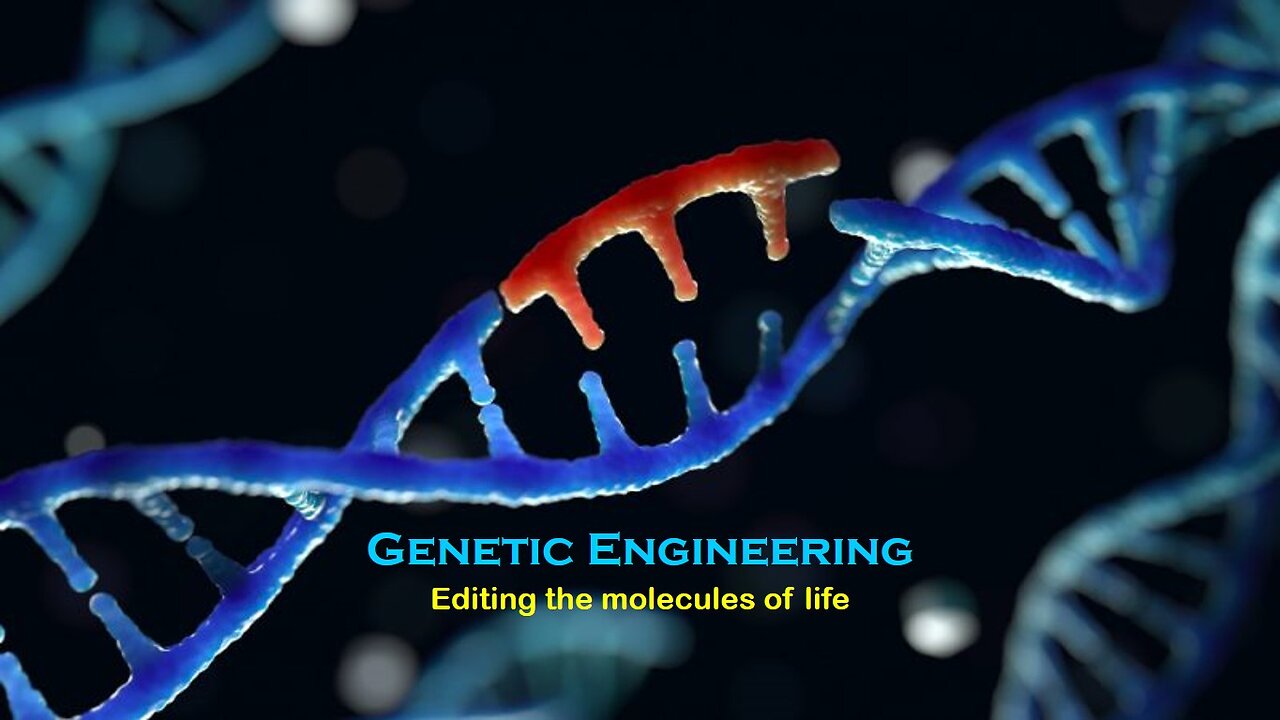Premium Only Content

"Biotechnology and Genetic Engineering: Shaping Tomorrow's World"
The future of genetic engineering and biotechnology holds immense promise and potential for both scientific advancements and practical applications. Here are some key developments and trends that may shape the field in the coming years:
1. **Precision Medicine**: Genetic engineering will continue to play a critical role in the advancement of personalized medicine. Tailoring treatments to an individual's genetic makeup will become increasingly common, resulting in more effective and targeted therapies with fewer side effects.
2. **Gene Editing**: Technologies like CRISPR-Cas9 will continue to evolve, allowing for precise and efficient gene editing. This has vast implications for treating genetic diseases, creating disease-resistant crops, and even enhancing certain human traits.
3. **Synthetic Biology**: The field of synthetic biology will expand, enabling scientists to design and engineer biological systems for specific purposes. This could lead to the creation of custom microbes for industrial processes, biofuel production, and environmental remediation.
4. **Biotechnology in Agriculture**: Genetic modification of crops will advance to address global challenges such as food security, climate change, and the reduction of pesticides and fertilizers. Drought-resistant, pest-resistant, and nutrient-rich crops will become more widespread.
5. **Regenerative Medicine**: Tissue engineering and regenerative medicine will advance, offering new hope for patients with organ failure or tissue damage. Scientists will continue to work on growing organs in the lab and developing methods to enhance tissue repair and regeneration.
6. **Bioinformatics**: As data collection in genomics and proteomics accelerates, the role of bioinformatics and artificial intelligence in analyzing and interpreting this data will become increasingly important. Machine learning algorithms will help identify patterns and predict disease susceptibility.
7. **Ethical and Regulatory Challenges**: As genetic engineering and biotechnology advance, there will be ongoing debates and discussions surrounding ethics, safety, and regulation. Balancing innovation with ethical considerations and ensuring proper oversight will be crucial.
8. **Biotechnology and the Environment**: Biotechnology will play a pivotal role in addressing environmental challenges, including the development of biodegradable plastics, biofuels, and the cleanup of polluted ecosystems.
9. **Human Enhancement**: Ethical considerations aside, there may be advancements in biotechnology aimed at enhancing human capabilities, such as cognitive enhancements or life extension technologies.
10. **Public Engagement and Education**: As these technologies become more prevalent, there will be a growing need for public education and engagement to ensure that the benefits are widely understood and that any concerns are addressed.
In the future, genetic engineering and biotechnology have the potential to revolutionize healthcare, agriculture, environmental sustainability, and various other fields. However, it is crucial that these advances are pursued with careful consideration of ethical, safety, and regulatory concerns to ensure that they benefit humanity as a whole.
-
 1:04:59
1:04:59
Man in America
13 hours ago“Summoning the Demon” — The AI Agenda Is FAR WORSE Than We Know w/ Kay Rubacek
53.9K43 -
 2:16:48
2:16:48
Tundra Tactical
11 hours ago $0.13 earned🎯💥 The World’s Okayest Gun Show 🔫😂 | LIVE Tonight on Rumble!
35.3K1 -
 3:36:03
3:36:03
Mally_Mouse
1 day ago🌶️ 🥵Spicy BITE Saturday!! 🥵🌶️- Let's Play: Tower Unite!
60.2K2 -
 58:59
58:59
MattMorseTV
11 hours ago $1.64 earned🔴Trump just BROKE Newsom.🔴
77.7K92 -
 18:14
18:14
Her Patriot Voice
11 hours agoWho Is WORSE for NYC: Trump Girl or Socialist?
58.4K35 -
 3:39:42
3:39:42
SavageJayGatsby
11 hours agoSpicy Saturday with Mally! | Road to 100 | $300 Weekly Goal for Spicy Bites!
54K1 -
 3:35:50
3:35:50
FomoTV
13 hours ago🚨 Swamp Theater: FBI Raids Bolton 🕵 Still NO Epstein Files, Trump's Troops & the Red Heifer Hoax 🐂 | Fomocast 08.23.25
25.3K7 -
 6:04:40
6:04:40
Akademiks
16 hours agoRoc Nation & Meg Thee Stallion did a 7 HOUR Deposition with me. Drake Secret Kid Finally Revealed.
61.2K3 -
 24:19
24:19
Stephen Gardner
12 hours ago🚨BREAKING: FBI Raid of John Bolton’s House Reveals THIS!
63.1K146 -
 8:31
8:31
MattMorseTV
14 hours ago $1.22 earnedTexas just did the IMPOSSIBLE.
52.6K70